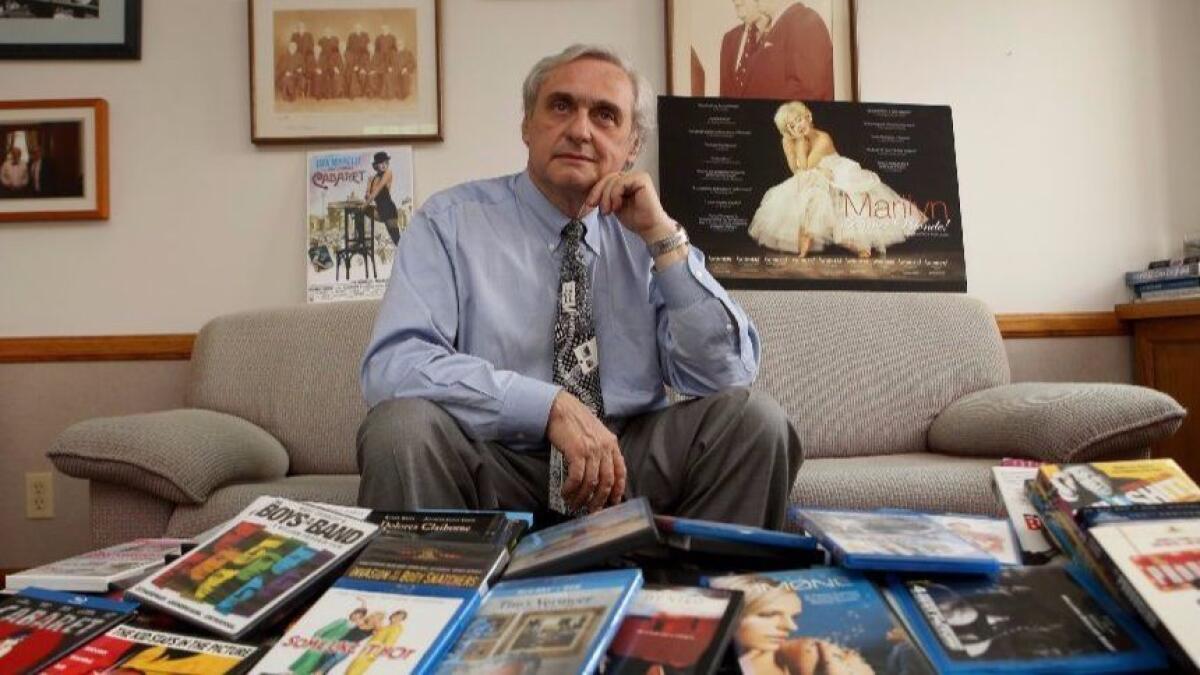9th Circuit Judge Alex Kozinski is accused by former clerks of making sexual comments

Six former clerks and externs said U.S. 9th Circuit Court Judge Alex Kozinski made inappropriate sexual comments to them, the Washington Post reported Friday.
Heidi Bond, a Kozinski clerk from 2006 to 2007, told the Post that Kozinski called her into his office repeatedly, showed her pornography on his computer and asked if it aroused her or if she thought it was Photoshopped.
Kozinski, 67, reached by the Los Angeles Times on Friday, said: “I have no recollection of that happening.”
He said Bond, now a novelist, was a “good clerk,” and he recommended her for two clerkships at the U.S. Supreme Court.
After Bond left the legal profession, he said, she sent him an email asking if he wanted an audio version of one of her novels. Kozinski described it as a romance novel with one chapter containing “very torrid sex.”
Kozinski said he was unaware of any formal complaint against him and noted that he has employed 120 clerks and 400 externs over the years.
“If this is all they are able to dredge up after 35 years, I am not too worried,” he said in a telephone interview.
The Post said those who complained about Kozinski worked for him over the years, the latest in 2012.
Bond and Emily Murphy, now a law professor, were the only women who agreed to allow the Post to use their names.
Murphy, who clerked for a different 9th Circuit Court of Appeals judge, said Kozinski joked to her in front of other people that she should work out naked at a courthouse gym because so few people used it, according to the Post.
The Times reported in 2008 that Kozinski kept sexually explicit materials on a private server.
Kozinski, then chief judge of the 9th Circuit, acknowledged in an interview with The Times back then that he had posted the materials.
They include a photo of naked women on all fours painted to look like cows and a video of a half-dressed man cavorting with a sexually aroused farm animal.
Kozinski acknowledged in the interview that some of the posts were inappropriate, but he defended other content as “funny.”
After The Times published its report, Kozinski asked for a judicial investigation. The probe determined that the judge had not intended the public to see the material and that Kozinski had not realized his private server could be viewed on the Internet.
A panel of federal judges from another circuit admonished him, saying the folder had been made public because of an improper security configuration and the judge’s “carelessness.”
Federal judges serve life terms. Congress can impeach them and the Senate convict them, but removal from office is rare.
Kozinski, appointed by President Reagan, is considered a Libertarian and an iconoclast who has used the bench to float quirky ideas.
In one case, he wrote that lethal injection should be scrapped for the firing squad, though he thought the guillotine the best method.
Kozinski said Friday that he wished “Heidi had said something to me.”
Although stressing he did not remember any such incidents, he said: “I wish she could have talked to me about it.”
He said he often uses “salty” language at work and once learned from his secretary that it offended a male clerk who was a Mormon. Kozinski said he stopped using the language.
“I don’t remember ever showing pornographic material to my clerks,” he said.
Kozinski said “lots and lots” of his former clerks reported to him in recent days that they had been contacted by the Post. In response to the Post, Kozinski issued the following statement:
“I have been a judge for 35 years and during that time have had over 500 employees in my chambers. I treat all of my employees as family and work very closely with most of them. I would never intentionally do anything to offend anyone and it is regrettable that a handful have been offended by something I may have said or done.”
David Madden, a spokesman for the 9th Circuit, forwarded a copy of Kozinski’s statement and referred further questions to a public relations firm in Los Angeles.
Madden did not respond to questions, posed in a telephone message and in emails, about whether the 9th Circuit might investigate the charges.
He referred questions to Winner & Associates, a Los Angeles firm that does public policy communications.
Chuck Winner, vice chairman of the company, said a friend asked him to assist Kozinski and that he was doing so without charge.
Winner said he interviewed both Kozinski and his wife and was unaware of any investigation into the allegations published by the Post.
An attempt to reach Bond through her agent was unsuccessful. In a blog post, Bond described her interactions with Kozinski. She writes her novels and her blog under the pen name Courtney Milan.
She said in her post that Kozinski showed her pornographic pictures on his private server, and she told him they appeared to have been Photoshopped.
“Does this kind of thing turn you on?” she quoted him as saying. She told him no.
“It doesn’t do anything for me either,” she said he replied. “People just send me these things. I don’t know why. But I like to keep them as a curiosity. I don’t understand why people find this sort of thing arousing.”
Murphy, a professor at UC Hastings College of the Law, was reached through email.
She said she was unavailable for an interview Friday night because she was attending a wedding rehearsal.
Twitter: @mauradolan
UPDATES:
7 p.m.: This article was updated with additional details and comments from Heidi Bond posted on her blog.
5:45 p.m.: This article was updated with Murphy saying she was unavailable to comment Friday night, and details about a public relation firm’s representation of Kozinski.
5 p.m.: This article was updated with additional background and the full text of a statement Kozinski had given to the Washington Post.
4:20 p.m.: This article was updated to say that efforts to contact the accusers were not immediately successful.
This article was originally published at 3:55 p.m.
More to Read
Sign up for Essential California
The most important California stories and recommendations in your inbox every morning.
You may occasionally receive promotional content from the Los Angeles Times.











